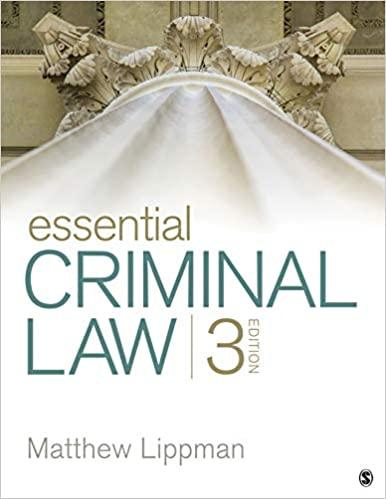Question
Need assistance writing a constructive analysis/comment in response to the following post of a classmate. It can be creative ( This will help me get
Need assistance writing a constructive analysis/comment in response to the following post of a classmate. It can be creative ( This will help me get a general idea of how to ):
Facts:
Adam and Mary are roommates and have been friends since childhood.Mary works for a prominent Wall Street brokerage house.Mary mentioned to Adam that it was time to sell a specific vitamin stock he held before her brokerage house posted its' negative earnings.Mary was not aware that Adam was a member of the board of directors for the vitamin company.Adam warned other board members and they sold their stock for a profit before the announcement.The board of directors did not advise anyone else in the company of the nonpublic information and the 401(k) accounts of MeadowLife Vitamin employees took a significant loss.
Legal Issues:
Mary and Adam have engaged in tipper-tippee trading (Cheeseman, 2019, p. 711) (Skeen, 2020).Mary disclosed to Adam nonpublic information about MeadowLife Vitamins concerning their negative earnings.Mary is the tipper in this case.Adam used this information and sold his shares in the company for a profit.Adam is the tippee in this case.However, Adam did not keep this information to himself.Adam became the tipper once he advised his fellow board members of the nonpublic information.They too sold their stock for a profit.
Mary could be held liable for disclosing this information to Adam because she violated Section 10(b) and Rule 10b-5.InSalman v. United States, "the U.S. Supreme Court held that a tippee is liable for violating Section 10(b) and Rule 10b-5 even if the tipper did not personally receive money or property from the tippee in exchange for the tips and did not personally benefit from the tippee's trading" (Cheeseman, 2019, p. 712).
Adam could be held liable for disclosing this information to the other board members of MeadowLife Vitamins.Adam and the other board members violated Section 10(b) and Rule 10b-5 by engaging in insider trading.They are all insiders (due to their director positions held with the company) that possessed material, nonpublic information that they utilized to make a profit by selling shares of their corporation prior to negative earnings being publicly released (Cheeseman, 2019, p. 710).
Mary, Adam and entire board of directors could be held criminally and civilly liable for tipping.Under the Insider Trading Act, the SEC could obtain a civil penalty of up to 3 times the illegal benefits received from their insider trading with the fine being paid to the U.S. Treasury (Cheeseman, 2019, p. 709) (Skeen, 2020).In addition, under the Sarbanes-Oxely Act, Adam and the board of directors may by prohibited from serving as officers or directors of a public company (Cheeseman, 2019, p. 709).It is a criminal offense under Section 32 of the Securities Exchange Act of 1934 to willfully violate the 1934 act or rules (Cheeseman, 2019) and according to the Sarbanes-Oxley Act, a person that willfully violates the Securities Exchange Act of 1932 is subject to be fined, imprisoned or both (Cheeseman, 2019, p. 710).
If we take a look at the employees who suffered by their 401(k) accounts losing value, they may be able to file a class action lawsuit against the board of directors of MeadowLife Vitamins.Each employee shares a common claim collectively against MeadowLife Vitamins (Cheeseman, 2019, p. 49) and may be able to recover some of their monetary loss through the profits that the board of directors gained from the sale of the shares.
Ethical Issues:
The ethical situation that stands out the most is that the board of directors chose to capitalize on the insider information given to them.No regard was given to the employees that would lose their retirement funds and essentially their employment.It is ironic for Adam to tell Mary she engages in immoral activity when his actions were the epitome of unethical.
In our lecture for this week we were introduced to a4-Step Ethical Decision Making Processto aide in analyzing ethical problems (Skeen, 2020).Following is my version of how that process should have been worked out by the MeadowLife Vitamins board of directors.
- Fact: Adam and the board of directors of MeadowLife Vitamins are in possession of insider information that negative earnings will be publicized for their company.
- Identify Conflict: Adam and the board of directors can sell their stock in MeadowLife Vitamins and make a profit. However, as the board of directors they have a duty to act in the best interest of the company and the employees.
- What Could You Do: The board of directors can sit on the insider information and do nothing.
The board of directors can call a company meeting and advise everyone of the insider information.
The board of directors can keep the insider information secret among each other and sell their stock for a profit.
- Decide: In the best interest of the company, the board of directors should call a meeting and advise all employees of the negative earnings that will publicized. If this is a company that is built on morality, then it will want to do what is right by all the players involved.All employees should be afforded the opportunity to prepare for the inevitable.
Cheeseman, H. R. (2019).Business Law (10th Edition).New York: Pearson.
Skeen, D. (2020, November 2).MNGT 3280 Week 3 Lecture Notes on Business Ethics and Related Issues.Retrieved from Webster University: https://worldclassroom.webster.edu/courses/1383260/pages/week-3-business-ethics-and-related-issues?module_item_id=14053611
Step by Step Solution
There are 3 Steps involved in it
Step: 1

Get Instant Access to Expert-Tailored Solutions
See step-by-step solutions with expert insights and AI powered tools for academic success
Step: 2

Step: 3

Ace Your Homework with AI
Get the answers you need in no time with our AI-driven, step-by-step assistance
Get Started


